Shanks Blu-ray Movie
HomeShanks Blu-ray Movie 
Olive Films | 1974 | 94 min | Rated PG | May 28, 2013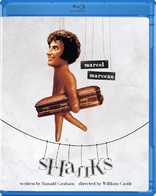
Movie rating
6.5 | / 10 |
Blu-ray rating
| Users | 0.0 | |
| Reviewer | 3.0 | |
| Overall | 3.0 |
Overview
Shanks (1974)
A mute puppeteer uses a deceased scientist's invention to control dead bodies like puppets.
Starring: Marcel Marceau, Tsilla Chelton, Philippe Clay, Helena Kallianiotes, Larry BishopDirector: William Castle
| Horror | Uncertain |
| Fantasy | Uncertain |
Specifications
Video
Video codec: MPEG-4 AVC
Video resolution: 1080p
Aspect ratio: 1.78:1
Original aspect ratio: 1.85:1
Audio
English: DTS-HD Master Audio Mono
Subtitles
None
Discs
25GB Blu-ray Disc
Single disc (1 BD)
Playback
Region A (C untested)
Review
Rating summary
| Movie | 2.5 | |
| Video | 4.0 | |
| Audio | 4.0 | |
| Extras | 0.0 | |
| Overall | 3.0 |
Shanks Blu-ray Movie Review
A one of a kind misfire.
Reviewed by Jeffrey Kauffman May 30, 2013Mel Brooks achieved one of the greatest pieces of stunt casting ever in his 1976 comedy Silent Movie (contained in The Mel Brooks Collection ) with one of those “blink and you’ll miss it” cameos by Marcel Marceau, who offered what is perhaps that film’s biggest laugh. In fact the Marceau moment arguably was the most memorable thing about Silent Movie, something that was mentioned in many of the contemporary reviews of the film, some of which weren’t generally kind to the movie but which found this particular bit hysterical. Some casual viewers who were passingly aware of who Marceau was may have thought that Silent Movie was Marceau’s film debut, but in fact the world famous mime had been starring in shorts for years, usually in character as “Bip”, one of his iconic creations. But two years before he deigned to drop by Silent Movie for a minute or two, Marceau had starred in one of the oddest films in his (or anyone’s) filmography, the 1974 William Castle chiller Shanks, a patently bizarre piece that from our vantage point in the early years of the 21st century might be seen as a gruesome mash up of Frankenstein and Being John Malkovich (and, no, I’m not kidding). This was the last film directed by Castle, the would be auteur who had struggled to escape his reputation as a “gimmick” huckster (as parodied rather lovingly in the John Goodman film Matinee), but who had finally managed a modicum of respectability in 1969 with Rosemary's Baby. Castle was never able to really capitalize upon that outstanding success, though he continued to have a relatively close relationship with Paramount, the studio which had raked in untold piles of cash with the Ira Levin thriller and which continued to offer Castle’s films the imprimatur of a major studio. But someone at Paramount must have wondered what they had gotten themselves into with Shanks, a film that plays like rather like a drug fueled fairy tale (something that is hinted at by the opening allusion to The Brothers Grimm, even if whoever made the title card wasn’t quite sure how to spell the siblings’ surname).
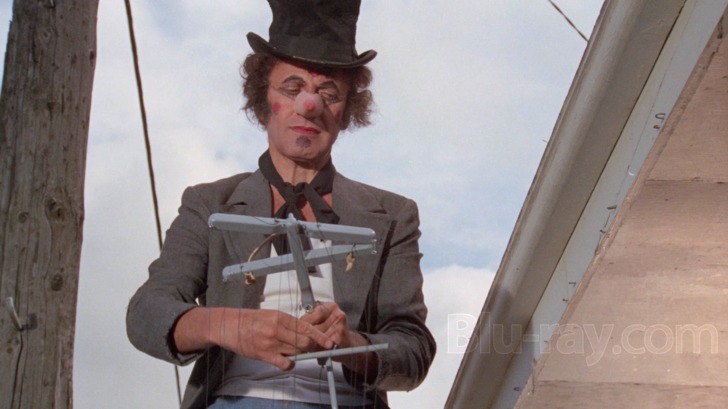
Though Castle probably would have denied it, it’s hard not to think that the casting of Marceau was just the last in a long series of gimmicks the producer offered through the years. But that very gimmick—if indeed we agree that that’s what it was—has some built in issues. How to parlay a legendary mime’s persona to a “talkie”? In this regard, Castle and his scenarist Ranald Graham toe a fine line that actually presages what Mel Brooks himself would do in Silent Movie, namely evoking the era of the silent film by offering plenty of interstitial titles announcing everything from plot developments to character descriptions and even occasionally motivations. There is dialogue in Shanks, but it’s relatively innocuous and in fact is not even necessary to understand what’s going on. Also, Malcolm Shanks, one of two characters Marceau plays in the film, is a deaf mute, an infirmity which by its very nature eschews speaking and which allows Marceau to drift through scenes relying solely on body language.
Marceau also (occasionally at least) depicts a character named Old Walker, an aging inventor who does occasionally spout a word or two, but who, like Malcolm Shanks, is able to convey droves of information without uttering a word. The film plays out rather like a fairy tale, as evidenced by the aforementioned allusion to the Grim(m) Brothers’ famous offerings, with Malcolm, a puppeteer who lives with a harridan sister and her loutish husband, ultimately coming into contact with Walker, a man who has come up with technology that implants electrodes into dead creatures and allows them to move as if alive. While Old Walker shows Malcolm the technology at work with a deceased frog and rooster, after Old Walker himself shuffles off of this mortal coil, Malcolm picks up the figurative torch and decides to start reanimating humans, starting with Walker himself.
Shanks is an almost deliberately odd piece of filmmaking that is hard to pigeonhole. It’s certainly not traditional horror, even within the sometimes silly (if rarified) air of a William Castle production. There are seemingly intentionally funny bits as well, including some ludicrous movements of various reanimated dead folk, and yet the film isn’t particularly comedic, either. There’s an aura of sadness, even outright melancholy, suffusing this effort, since Malcolm is abused by his family and other passers-by, with only a young girl (Cindy Eilbacher) seeming to really connect with him. And that element is played to some bizarrely creepy effects when there seems to be a romantic connection between Malcolm and the young adolescent. Shanks’s advertising tagline was “Deliciously Grotesque”, but some viewers responding to the quasi-romantic angle at least might want to argue about just how “delicious” Shanks ends up being.
The very weirdness of Shanks is both its most defining characteristic as well as what will ultimately probably attract viewers. The film frankly doesn’t work a lot of the time, perhaps because it’s neither fish nor fowl, figuratively speaking. There’s a whimsical quality to Shanks that seems almost deliberately at odds with its melancholic tone and its quasi-horror film trappings. A Frenchman like Marceau might have been assumed to be capable of crafting a perfect filmic soufflé, but in the case of Shanks, there’s a certain flatness that permeates the attempt and keeps the film from ever rising much above a certain curiosity factor.
Shanks Blu-ray Movie, Video Quality 
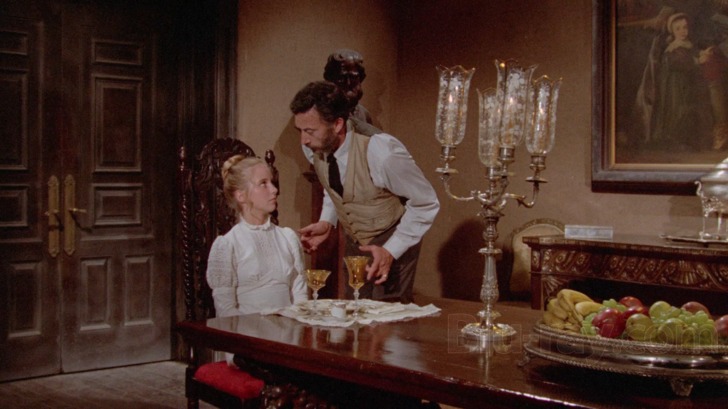
Shanks is presented on Blu-ray courtesy of Olive Films with an AVC encoded 1080p transfer in 1.78:1. This is another really nice looking offering from Olive, one that probably benefits from the fact that the film was a colossal dud on its release and never even showed up on television very often, leaving the source elements utilized for this high definition transfer in remarkably good condition. That said, it's obvious that Castle wasn't working with a huge budget here, and some of the cinematography is kind of bargain basement looking, especially some of the outdoor locations shots which suffer from a certain fuzzy ragged quality. That is offset by the studio sequences which pop quite nicely, at least relatively speaking. As with some other sixties and seventies offerings from Olive, colors may have faded just slightly, and the image never approaches the crystalline clarity of more contemporary outings, but close-ups offer quite good fine detail (to the point that prosthetics in Marceau's make-up are clearly visible). Once again there appears to have been no digital tweaking of any kind applied to the source elements.
Shanks Blu-ray Movie, Audio Quality 
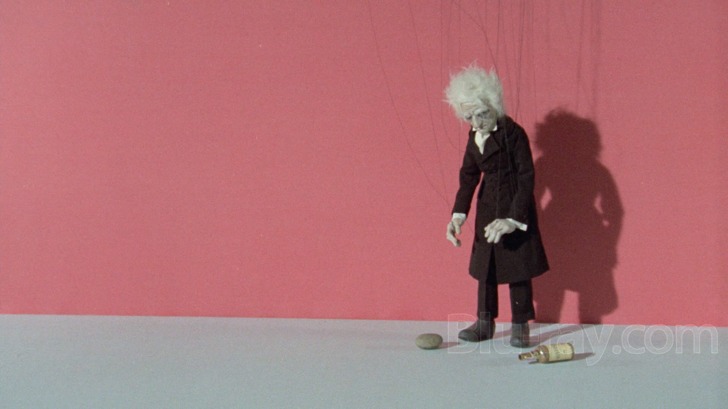
Believe it or not, Shanks actually was an Oscar nominee the year it was released, for Alex North's haunting (if minimalist) score, one that comes through rather well on this Blu-ray's lossless DTS-HD Master Audio Mono track. North, certainly one of the more protean talents of his era, doesn't ply traditional horror score tropes here and instead offers a moody, introspective set of cues that are arguably one of Shanks' best features. What little dialogue is in the film comes through clearly and cleanly, and the occasional foley effects are also rendered very well. Fidelity is excellent, but dynamic range is negligible.
Shanks Blu-ray Movie, Special Features and Extras 
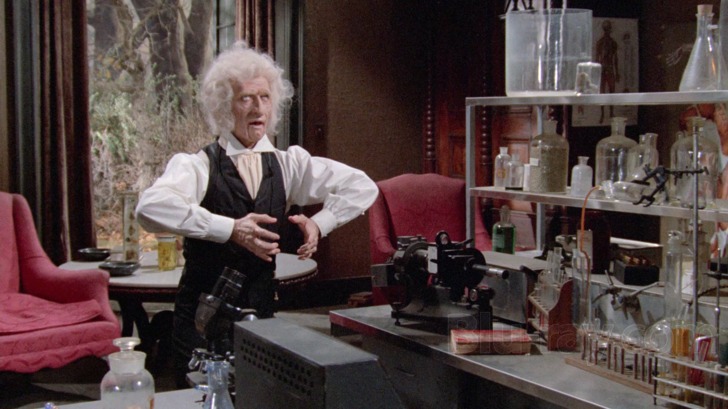
No supplements are offered on this Blu-ray disc.
Shanks Blu-ray Movie, Overall Score and Recommendation 
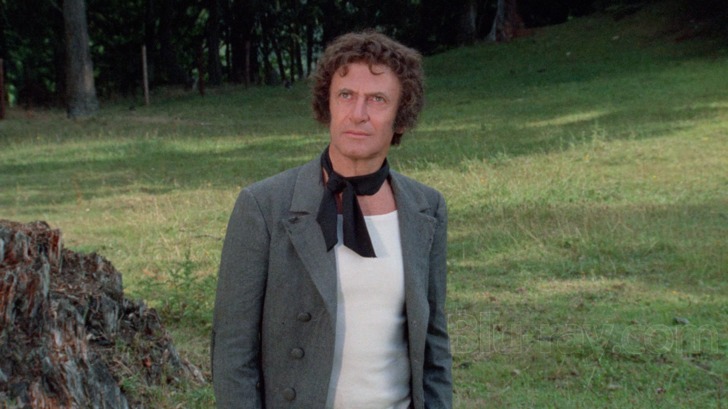
Shanks is one of those films that has achieved cult status for any number of reasons, but which never quite fulfills its promise. Still, it's an unforgettable experience. Marceau's physical prowess informs both of his portrayals here (just watching him enter a gothic mansion as Malcolm Shanks is an exercise in grace and fluidity), and the basic premise here is certainly sound (no pun intended). But Castle would have done better to have either made a comedy or a horror film, instead of kind of waffling between the two. Neither genre is fully served here, and in fact the sadness surrounding Malcolm's state of affairs gives the film an inescapable feeling of pathos that ultimately becomes self-defeating. The less said about the romance between Malcolm and the young girl, the better. Despite all these issues, fans of Castle will no doubt want to check out this release, as it has long been a Holy Grail of sorts since it disappeared so quickly after its theatrical release and was rarely if ever resurrected (and/or reanimated) for television broadcast. Shanks is in many ways a failure, but for its distinctive oddness, this Blu-ray still comes Recommended.
Similar titles
Similar titles you might also like

Baron Blood
Gli orrori del castello di Norimberga
1972

Lemora: A Child's Tale of the Supernatural
1973

Horror Rises from the Tomb
El espanto surge de la tumba
1973

Dracula A.D. 1972
1972

The Satanic Rites of Dracula
Count Dracula and His Vampire Bride
1973

Alucarda
Alucarda, la hija de las tinieblas
1977

Vampyres
Daughters of Dracula
1974

The Phantom of the Opera
Il fantasma dell'opera
1998

Revenge of the Blood Beast
Il lago di Satana
1966

Stanley
1972

Terror-Creatures from the Grave 4K
5 tombe per un medium 4K
1965

Nightmare Castle
Amanti d'oltretomba
1965

Satan's Children
Slipcover in Original Pressing
1975

The Haunted Palace
1963

Frightmare
1974

Grave of the Vampire
1972

The Devil's Partner
1961

I Drink Your Blood
Also Includes = I Eat Your Skin and Blue Sextet
1970

Twins of Evil
1971

Countess Dracula
1971

